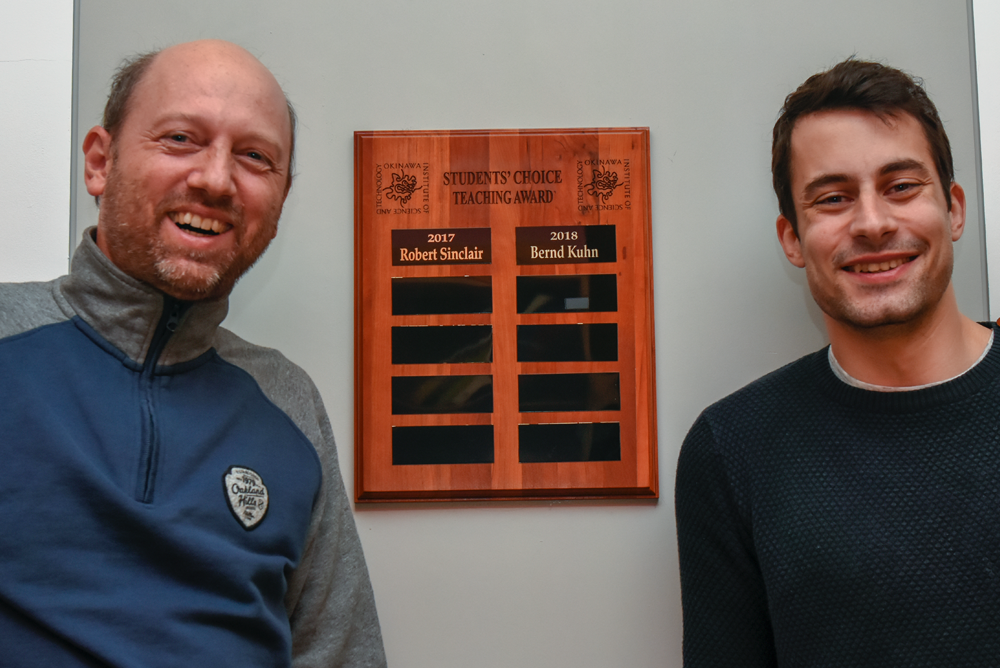2018 - Bernd Kuhn

Congratulations are due for Prof. Bernd Kuhn, the winner of 2018’s teaching award!
The award was presented in late November by Andreas Thomasen, then Academic Officer of the OIST Student Council, in recognition of exceptional teaching and based on nominations submitted by the student body. Prof Kuhn’s classes on Physics for Life Sciences have proved enormously popular with students, with many praising the practical angle of the course that incorporates field study such as examining fluorescence in corals, utilizing a concise approach to potentially complex subject matter.
“It’s great to have the natural resources of Okinawa to use for classes,” said Prof. Kuhn, “I always try to find the things in the subject that are surprising and engaging to keep students involved in the learning process”.
It’s an approach that has paid dividends with classes of satisfied students: “What I really like about the class is that you can have lots of discussions,” said Tsung-Yen Huang, “As a student, I do not have too much background in physics, so this process helped me to quickly assimilate the unfamiliar knowledge such as examining fluorescence in corals or building a microscope from lenses."
Maki Maeda added: “He welcomes students from all different backgrounds and makes us feel comfortable to take the course. He delivers lectures slowly enough for out-of-field students; yet the lectures are still interesting for in-field students as well. No one in the class would feel left out.”
“I’m really honored!” said Prof Kuhn. Students can make their nominations for the 2019 award to the student council later this year.

Prof Bernd Kuhn's Teaching Philosophy
B. Kuhn, January 2019
In primary and secondary school, we have to learn about a wide range of topics to give us a broad overview of human achievements and knowledge. Then, as undergraduates, we specialize in a subject, but still we have to scale the accomplishments of many giants. There is much to learn, but it is relatively easy because we can simply follow other people’s thoughts by listening or reading. At graduate school, however, we confront, for the first time, the limits of current human knowledge. There are no longer prescribed paths, and in fact, there are endless options for new paths. As it turns out, building a new path requires knowledge, hard work, and unquestionably, the capacity to suffer and to recover from disappointment and failure. Therefore, graduate studies require drive. This driving force is curiosity, the curiosity to go where nobody else has gone before, the curiosity to see what nobody else has ever seen before. Additionally, there must be excitement to discover new things and to understand things that have not been understood before.
A graduate course should therefore not only convey knowledge and teach problem-solving skills but should also stimulate curiosity and excitement. It is a little bit like going back to early childhood – we explore, touch, play, make mistakes (hopefully, not too many), guess, wonder, etc. We build a microscope from a few lenses, go on an excursion to watch coral fluorescence during low tide at night, dissect a two-photon microscope, and do many other small experiments. We also try to find connections between our islands of knowledge. For example, did you know that the brain is white for the same reason that clouds are white? We challenge knowledge of even mundane matters. For example, did you know that the sun is white?
At OIST we have the luxury of small classes and highly motivated, interdisciplinary students. Therefore, discussions can be easily triggered, and asking questions is encouraged. Automatically, everyone gets involved, and excitement and curiosity for further exploration and self-study are awakened! Get ready to explore!



